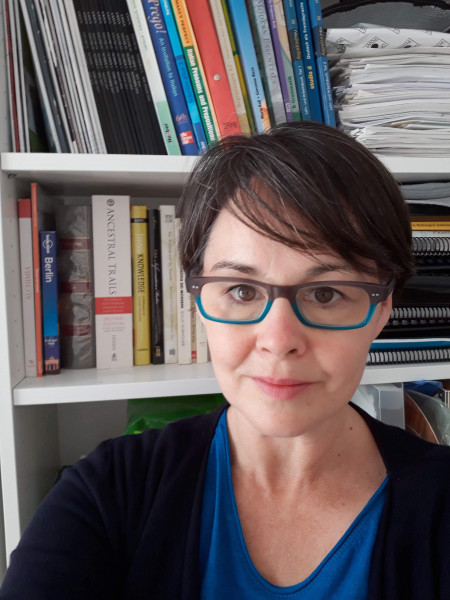
Dr Tamara Lopez
Lecturer In Computing & Communications
School of Computing & Communications
Biography
My research investigates software engineering as a form of world-making, in which developers, like all people, create significant spaces with one another through shared activities, ideas, language and materials. With links to safety science, organisational psychology and the humanities, my work critically engages with dominant narratives in software engineering trade and research literatures to illuminate and improve the working lives of professional developers.
Using qualitative methods, my field studies offer empirical insights into how cooperative, human aspects of development enable good engineering practice. My research is applied to develop teaching materials for OU modules (currently: TM112, in development: TM113, TM253; prior: TM359), and I have produced a downloadable toolkit for exploring social aspects of security in the workplace that has been been used in companies, universities and summer schools.
A central strand of my research focuses on security as a social practice. Through projects like Motivating Jenny and publications such as Securing Code: A View on the Cultural Aspects of Resilience (2025), I examine how developers engage with security beyond technical compliance—highlighting the role that professional identity, organizational influence, and situational context play in secure software.
Another key area of my programme looks at localised problem solving in everyday development, as described in Bumps in the Code (2021). Recently, I have extended this work to examine socio-technical resilience at the team level in the STRIDE project and in publications such as a framework for identifying resilient performance in software development teams (Accounting for Socio-Technical Resilience in Software Engineering, 2023).
Prior to becoming a researcher, I worked for 14 years as a professional software developer. As a research software engineer, I held positions at Indiana University and King's College in London where I contributed to leading digital humanities projects including The Chymistry of Isaac Newton and the Fine Rolls of Henry III. Longer ago in Chicago, Illinois, I built first-generation websites for local businesses and community organisations including Howard Brown Health Center; in San Francisco I was a front-end engineer at the Snap.com portal; and in Dublin, Ireland I was a member of the web booking development team at Aer Lingus.
I hold a Master of Information Science and a Master of Library Science (Indiana University) and a PhD (Open University).
Funded Projects
- Co-investigator for “Sociotechnical modelling of resilient arctic communities” a project to foster collaboration between researchers at the University of Iceland and the Open University (NERC Arctic Office, UK-Iceland Arctic Science Partnership Scheme 2024-2025).
- Co-investigator for STRIDE, a project examining the relationship between socio-technical resilience and automation (EPSRC, EP/T017465/1).
- Named post-doctoral research associate on Motivating Jenny, a project that investigated ways to initiate and sustain secure software development practices among developers who are not experts in security (NCSC).
- Named researcher on SAUSE: Secure, adaptive, usable software engineering (EPSRC, EP/R013144/1)
Undergraduate Supervision
- Maryam Aswat, Soft skills in Software Engineering. EPSRC DTP Summer Intern, 2024. Presented at the 2025 BCS Women Lovelace Colloquium.
- Georgia Losasso, Storytelling in Software Engineering. EPSRC DTP Summer Intern, 2023. Co-supervision with Chris Douce.
PhD Supervision
- Pablo Diaz Pedreira. Using Machine Learning To Find Errors In Software
- Russ Hinton. Gaining further insight through the use of exploratory data analysis and data mining in UK law enforcement.
- Colman Herron. Socio-technical Design of Healthcare Information Management and Technology Systems.
Phd Topics
Access and Participation
Though my schedule no longer permits, I am honoured to have served for two years as a library study volunteer, supporting Open University students in secure environments. In this role, I assisted students investigating topics in exercise science (E314), art history (AA315), philosophy (A853), international relations (DD313), English and literary criticism (A815, A335), and classics (A864).
Publications
Journal Article
Security requirements and secure software design (2025)
Securing Code: A View on the Cultural Aspects of Resilience (2025)
Security Responses in Software Development (2023)
The Case for Adaptive Security Interventions (2022)
Industry-Academia Research Collaborations During and After COVID-19 (2021)
Bumps in the Code: Error Handling during Software Development (2021)
Taking the Middle Path: Learning about Security Through Online Social Interaction (2020)
Presentation / Conference
Human-Machine Teaming and Team Effectiveness in AI tools for Software Engineering (2025)
Co-Designing Resilient Socio-Technical Software Systems (2024)
Meet your Maker: A Social Identity Analysis of Robotics Software Engineering (2023)
Security Thinking in Online Freelance Software Development (2023)
Accounting for socio-technical resilience in software engineering (2023)
Influences of developers' perspectives on their engagement with security in code (2022)
Informed consent and participant recruitment in studies of software practice (2022)
Challenges of Recruiting Developers in Multidisciplinary Studies (2022)
An Anatomy of Security Conversations in Stack Overflow (2019)
Talking about Security with Professional Developers (2019)
Hopefully We Are Mostly Secure: Views on Secure Code in Professional Practice (2019)